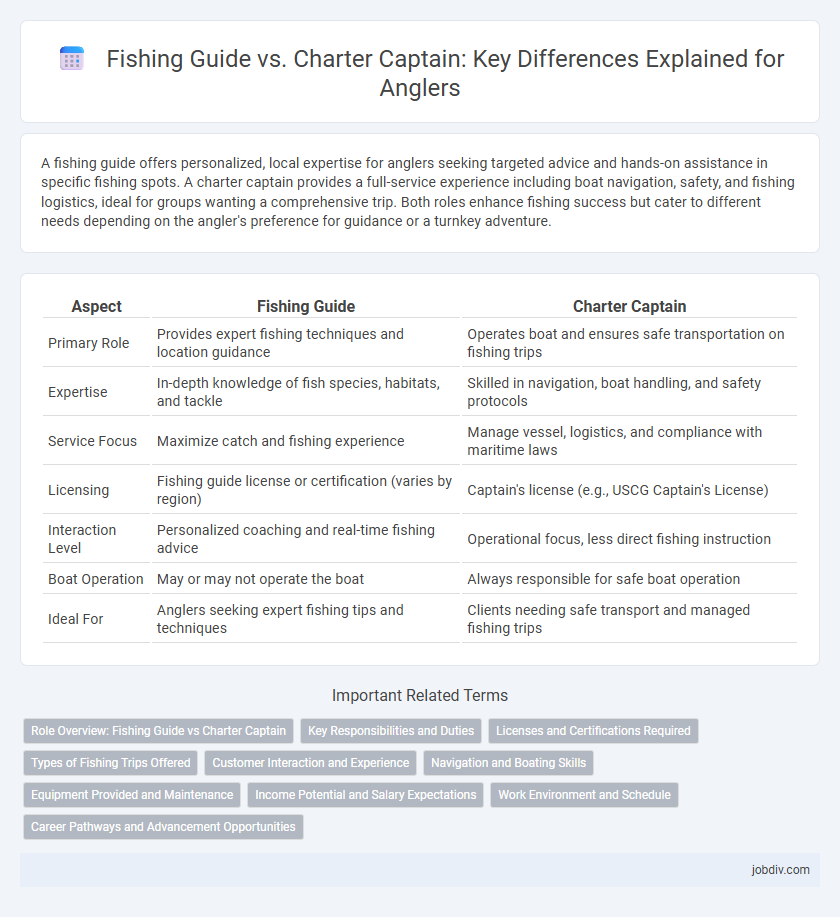A fishing guide offers personalized, local expertise for anglers seeking targeted advice and hands-on assistance in specific fishing spots. A charter captain provides a full-service experience including boat navigation, safety, and fishing logistics, ideal for groups wanting a comprehensive trip. Both roles enhance fishing success but cater to different needs depending on the angler's preference for guidance or a turnkey adventure.
Table of Comparison
| Aspect | Fishing Guide | Charter Captain |
|---|---|---|
| Primary Role | Provides expert fishing techniques and location guidance | Operates boat and ensures safe transportation on fishing trips |
| Expertise | In-depth knowledge of fish species, habitats, and tackle | Skilled in navigation, boat handling, and safety protocols |
| Service Focus | Maximize catch and fishing experience | Manage vessel, logistics, and compliance with maritime laws |
| Licensing | Fishing guide license or certification (varies by region) | Captain's license (e.g., USCG Captain's License) |
| Interaction Level | Personalized coaching and real-time fishing advice | Operational focus, less direct fishing instruction |
| Boat Operation | May or may not operate the boat | Always responsible for safe boat operation |
| Ideal For | Anglers seeking expert fishing tips and techniques | Clients needing safe transport and managed fishing trips |
Role Overview: Fishing Guide vs Charter Captain
A Fishing Guide specializes in providing expert advice, equipment setup, and local fishing techniques to individual anglers or small groups, enhancing their overall fishing experience on rivers, lakes, or coastal waters. A Charter Captain operates larger vessels for private or commercial fishing trips, responsible for navigating, ensuring passenger safety, and managing the boat's operations during offshore or deep-sea fishing excursions. Both roles require extensive knowledge of fish species, habitats, and weather conditions but differ in scope and vessel management responsibilities.
Key Responsibilities and Duties
A fishing guide primarily provides expert advice on local fishing spots, techniques, and equipment to enhance the angler's experience, often focusing on day trips and personalized instruction. In contrast, a charter captain is responsible for navigating the boat, ensuring passenger safety, managing fishing gear, and handling boat operations during extended fishing excursions. Both roles demand deep knowledge of fish behavior and water conditions, but the charter captain carries greater vessel management and regulatory compliance duties.
Licenses and Certifications Required
Fishing guides typically require a state-issued fishing guide license, which certifies their knowledge of local fishing regulations and safety procedures, while charter captains must hold a U.S. Coast Guard captain's license (Master Captain License) that authorizes them to operate commercial vessels carrying passengers. Both positions often need additional certifications such as CPR and first aid training to ensure client safety. The distinction lies in the charter captain's higher licensing standards due to their responsibility for vessel operation and passenger transport under federal maritime law.
Types of Fishing Trips Offered
Fishing guides typically offer personalized, small-group trips focusing on local lakes, rivers, or coastal fishing spots, specializing in species like bass, trout, or panfish. Charter captains usually operate larger boats for offshore or deep-sea fishing excursions, targeting big game fish such as marlin, tuna, or sailfish. The choice between a fishing guide and a charter captain depends on desired fishing techniques, trip scale, and preferred target species.
Customer Interaction and Experience
Fishing guides specialize in personalized customer interaction, offering tailored advice and hands-on assistance to enhance each angler's skills and enjoyment. Charter captains focus on safely navigating the vessel and managing the overall trip, ensuring a smooth experience while often handling larger groups. Both roles prioritize creating memorable fishing outings, but guides typically engage more closely with individual clients to optimize the fishing experience.
Navigation and Boating Skills
Fishing guides excel in navigation through shallow waters and local fishing hotspots, using intimate knowledge of tides and underwater structures to enhance angler success. Charter captains demonstrate advanced boating skills, adept at handling larger vessels in open waters and ensuring safety during long-distance trips or adverse weather conditions. Both roles require proficient navigation, but charter captains prioritize vessel operation and safety, while fishing guides focus more on strategic positioning for optimal fishing results.
Equipment Provided and Maintenance
Fishing guides typically provide essential fishing equipment such as rods, reels, tackle, and bait, ensuring it is well-maintained for consistent performance and client comfort. Charter captains often supply high-quality, specialized gear tailored to specific species and fishing conditions, emphasizing regular maintenance and upgrades to maintain safety and effectiveness. Both roles prioritize equipment upkeep to maximize the fishing experience, but charter captains generally offer more advanced and customized gear sets.
Income Potential and Salary Expectations
Fishing guides typically earn income through daily rates and tips, with average annual earnings ranging from $25,000 to $50,000 depending on location and season. Charter captains often receive a higher income potential by owning or managing fishing boats, generating revenue that can exceed $60,000 annually or more, especially in popular tourist destinations. Salary expectations for both roles vary widely based on experience, client volume, and regional demand within the fishing industry.
Work Environment and Schedule
Fishing guides typically work in flexible environments, often operating on small boats and interacting closely with clients on a day-to-day basis. Charter captains usually manage larger vessels, navigating longer trips and more structured schedules, often tailored to multi-day excursions. The work schedule for fishing guides tends to be seasonal and weather-dependent, while charter captains maintain more consistent demands due to bookings and vessel maintenance.
Career Pathways and Advancement Opportunities
Fishing guides often start with local knowledge and hands-on experience, advancing through client reputation and skill development in various fishing techniques. Charter captains typically require formal licensing, extensive maritime training, and may progress by acquiring larger vessels or managing fleet operations. Career advancement for both roles can include specialization in trophy fishing, leading ecotourism expeditions, or transitioning into marine conservation and educational roles.
Fishing Guide vs Charter Captain Infographic

 jobdiv.com
jobdiv.com